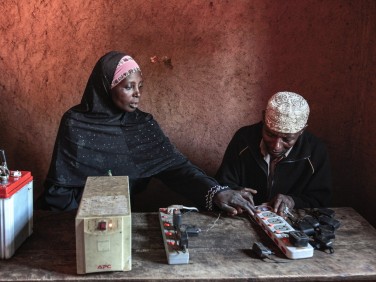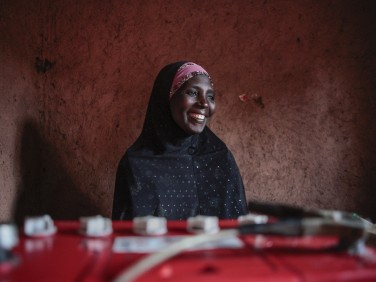
Meet Maida, the supercharged entrepreneur
The first thing you notice at Maida Mushimiyimana’s home in Agatare village is what’s not there. Besides a table, two benches, a large battery and a few charging mobile phones, the room is empty.
The second thing you notice, moments after the 43-year-old begins describing her Village Savings and Loans group, is how beautifully she speaks: “When 30 heads meet together you have 30 ideas to improve your life.”
By the standards of Rwanda’s Eastern Province – where 50.4 percent of the population is poor – Maida’s business is booming. The fledgling micro-entrepreneur earns 70,000 Rwanda francs (US $100) a month charging mobile phones at 100 RWF (US $0.14) a piece. So far, the biggest challenge has been keeping up with demand.
A new start
Like so many Rwandans, Maida, her husband and their three children lost everything during the 1994 genocide. They were the lucky ones. Across the country, an estimated 800,000 men, women and children – about 20 percent of the total population – lost their lives in just 100 days.
 Looking to start life afresh, Maida’s family settled in Agatare and began farming a small plot of land. “We could only get one bag of beans from the land. We had no money so it was difficult to buy the extra food we needed. It was also difficult to cook because we could not buy oil,” says Maida.
Looking to start life afresh, Maida’s family settled in Agatare and began farming a small plot of land. “We could only get one bag of beans from the land. We had no money so it was difficult to buy the extra food we needed. It was also difficult to cook because we could not buy oil,” says Maida.
Their situation is not unique. Despite growing optimism about Rwanda’s future – the country is among a handful in Africa that made “especially impressive progress” on the Millennium Development Goals, according to UNDP – there is still an immensely long way to go. True, the poverty rate decreased almost 12 percent between 2006 and 2011, but an astonishingly high 24 percent of Rwandans still live in extreme poverty. And although primary education enrolment has reached almost 97 percent – the highest anywhere in Africa – secondary school enrolment continues to languish at 28 percent.
The power of savings
Hand in Hand micro-entrepreneurs join savings and loans groups organised by Hand in Hand partner CARE for lots of reasons – ambition, loneliness, desperation. For Maida, it was simple curiosity. “They said they were for poor people but I did not know if it would make a difference in our lives,” she says. “Now we are no longer isolated and lead a hopeful life. Some did not join and they are sorry now.”
“When 30 heads meet together you have 30 ideas to improve your life”
In the beginning, the group could only manage 100 RWF (US $0.14) each in savings a week. Maida bided her time, all the while attending classes to learn basic business skills. But her plan was there from the very start.
An electric idea
Almost 65 percent of Rwandans owned mobile phones in July 2013. At the same time, only about 20 percent had electricity in their homes. With a gap like that, how do you charge your phone?
If you live in Agatare, you spend 3,000 RWF (US $4) to get to the nearby town of Rwamagana, then pay to get it charged there. At least, you used to. These days, ever since Madia borrowed 50,000 RWF (US $72) from the group and bought herself a battery, you walk a few minutes and charge it for 100 RWF (US $0.14). Simple.
Maida quickly repaid her loan and bought a second battery, followed by a solar panel to keep business running while her batteries themselves go off to get charged. Today, her customers include government officials who stop by to get their laptops charged.
Hope for the future
 Maida still meets with her savings group each and every week.
Maida still meets with her savings group each and every week.
“We all support each other now. Today our group saves 750 RWF (US $1) each a week, plus another 50 RWF (US$0.07) for our social fund. If someone is sick or their home is damaged, or if someone is getting married then we can help,” she says.
Maida also has a savings fund of her own to make sure her daughter Mukeshimana Zamdha, 10, has the brightest future possible. “Now that I have my own business I am able to pay the 20,000 RWF (US $28) a term that it costs to send her to a good school, with all the books, bags and uniforms she needs.”
Maida’s results
![]()
Average weekly savings of 750 RWF (US $1) per member
![]()
Personal savings will send her daughter to a good school
![]()
Access to informal medical insurance
Hand in Hand Eastern Africa and CARE Rwanda are co-operating to empower some 80,000 Rwandans, mostly women, to work their way out of poverty by running their own sustainable businesses. The three-year, US $3.2 million partnership is grounded in our shared belief in the power of entrepreneurship to fight poverty.
Next case study: Meet Habiba, weaving her way out of poverty
